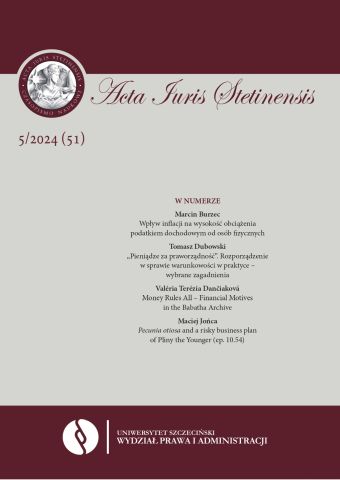






| Authors: |
Katarzyna
Jaworska-Biskup

Uniwersytet Szczeciński |
| Keywords: | usury Shakespeare Krystyn Ostrowski adaptation law and literature |
| Whole issue publication date: | 2024-12 |
| Page range: | 19 (209-227) |
| Downloads ?: | 42 |
| 1. | Alighieri D., Boska Komedia, przeł. J. Mikołajewski, Kraków 2021. |
| 2. | Ambrosino B., Four Hundred Years Later, Scholars Still Debate Whether Shakespeare’s “Merchant of Venice” Is Anti-Semitic. Deconstructing what makes the Bard’s play so problematic, „Smithsonian Magazine” 2016, https://www.smithsonianmag.com/arts-culture/why-scholars-still-debate-whether-or-not-shakespeares-merchant-venice-anti-semitic-180958867. |
| 3. | Arct M., Słownik ilustrowany języka polskiego, Warszawa 1916. |
| 4. | Aristotle, Politics, tłum. B. Jowett, Kitchener 1999. |
| 5. | Bartels E.C., Malta, the Jew and the Fictions of Difference: Colonialist Discourse in Marlowe’s The Jew of Malta, „English Literary Renaissance” 1990, t. 20, nr 1. |
| 6. | Bloom H., Shakespeare. The Invention of the Human, New York 1998. |
| 7. | Budrewicz A., Shylock in Poland. A Study in Anti-Semitism and Literary Translation, w: M. Nicolaescu i in. (red.), Perspectives on Shakespeare in Europe’s Borderlands, Bucureşti 2020. |
| 8. | Budrewicz A., The One Gentleman from Poland. Polonius and 19th Century Polish Translation, w: K. Kujawińska Courtney, G. Zinkiewicz (red.), Shakespeare: His Infinite Variety, Łódź 2017. |
| 9. | Cetera A., Wczesna recepcja dramatu, w: William Shakespeare, Kupiec wenecki, tłum. P. Kamiński, Warszawa 2015. |
| 10. | Cetera-Włodarczyk A., Kosim A., Polskie przekłady Shakespeare’a w XIX wieku, Warszawa 2019. |
| 11. | Ciborowska L., Wizerunek Żydów i relacji polsko-żydowskich w „Biesiadzie Literackiej” w latach 1913–1914, w: J. Ławski, B. Olech, Żydzi wschodniej Polski, Białystok 2014. |
| 12. | Coolidge S., Law and Love in the Merchant of Venice, „Shakespeare Quarterly” 1976, nr 27 (3). |
| 13. | Crompton L., Homosexuality and Civilization, Harvard 2003. |
| 14. | Crystal D., Crystal B., Shakespeare’s Words. A Glossary and Language Companion, London 2002. |
| 15. | Davidson I., Shylock and Barabas: A study in Character, „The Sewanee Review” 1901, nr 3. |
| 16. | Draper J.W., Usury in The Merchant of Venice, „Modern Philology” 1935, nr 33 (1). |
| 17. | Fajgenberg D., Lichwa, Szczęsne 2019. |
| 18. | Felsenstein F., Jews and Devils. Antisemitic Stereotypes of Late Medieval and Renaissance England, „Literature and Theology” 1990, t. 4, nr 1. |
| 19. | Halio Jay L., Introduction, w: W. Shakespeare, The Merchant of Venice, Cambridge 2008. |
| 20. | Hawkes D., The Culture of Usury in Renaissance England, New York 2010. |
| 21. | Jones N., Shakespeare’s England, w: D.S. Kastan (red.), A Companion to Shakespeare, Oxford 2000. |
| 22. | Kowalski T., Framing Polish-Jewish Relations through Shakespeare in Post-War and Contemporary Polish Theatre, „Multicultural Shakespeare. Translation, Appropriation and Performance” 2023, Vol. 28 (43). |
| 23. | Mahon J.W., The Fortunes of The Merchant of Venice from 1596 to 2001, w: J.W. Mahon, E.M. Mahon (red.), The Merchant of Venice. New Critical Essays, New York – London 2000. |
| 24. | Mahood M.M., Introduction, w: William Shakespeare, The Merchant of Venice, Cambridge 1987. |
| 25. | Maloney R.R., Usury in Greek, Roman and Rabbinic Thought, „Traditio” 1971, nr 27. |
| 26. | Marlowe Ch., The Jew of Malta, red. D. Bevington, E. Rasmussen, Oxford 1995. |
| 27. | Ostrowski K., Lichwiarz, Paryż 1868. |
| 28. | Ravenscroft S., Usury in the Inferno: Auditing Dante’s Debt to the Scholastcs, Comitatus, „A Journal of Medieval and Renaissance Studies” 2011, nr 42. |
| 29. | Rothstein E., Structure as Meaning in The Jew of Malta, „The Journal of English and Germanic Philology” 1966, t. 65, nr 2. |
| 30. | Sales R., Christopher Marlowe, London 1991. |
| 31. | Shaheen N., Biblical References in Shakespeare’s Plays, London 1999. |
| 32. | Shakespeare W., Koriolan, tłum. S. Barańczak, Poznań 1995, https://xx.polskiszekspir.uw.edu.pl/items/show/889. |
| 33. | Shakespeare W., Sen nocy letniej. Kupiec wenecki, Poznań 1992. |
| 34. | Shakespeare W., The Tragedy of Coriolanus, w: S. Wells, G. Taylor (red.), The Oxford Shakespeare. The Complete Works, Oxford 2005. |
| 35. | Shapiro J., Shakespeare and the Jews, New York 1996. |
| 36. | Szatek K., The Merchant of Venice and the Politics of Commerce, w: J.W. Mahon, E.M. Mahon (red.), The Merchant of Venice. New Critical Essays, New York – London 2000. |
| 37. | Tarnawski W., O polskich przekładach dramatów Szekspira, Kraków 1914. |
| 38. | The Oxford English Dictionary, J.A. Simpson, E.S.C. Weiner (red.), Oxford 1989. |
| 39. | The Oxford Shakespeare. The Complete Works, S. Wells, G. Taylor (eds.), Oxford 2005. |
| 40. | Tiffany, G., Names in The Merchant of Venice, w: J.W. Mahon, E.M. Mahon (red.), The Merchant of Venice. New Critical Essays, New York – London 2000. |
| 41. | Wojciechowski M., Charakter działalności gospodarczej Żydów w średniowiecznej Polsce, w: K. Marinow, K. Szadkowski, K. Węgrzyńska (red.), Varia Mediaevalia. Studia nad średniowieczem w 1050 rocznicę chrztu Polski, Łódź 2016. |
| 42. | Wright C.T., Some Conventions Regarding the Usurer in Elizabethan Literature, „Studies in Philology” 1934, nr 31 (2). |
| 43. | Zimmermann R., The Law of Obligations. Rzymskie fundacje tradycji cywilnej, Oxford – New York 1990. |